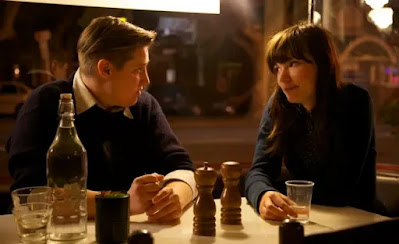The lives of grieving mother Rosalie and her daughter Maddie are changed forever when they meet Jed. A spark of hope for the future is rekindled within the household. But underneath, a deadly and morally corrupt triangle is taking shape.
Penance is a peculiar style of mini-series. Combining the tropes of the middle-aged woman falling for a young stud, and a mother grieving over the loss of her son, Penance is walking the tightrope between gold-digger and crime genres, touching on the thriller genre as well with only three episodes to complete all of the various arcs brought into play.
The series is adapted by Kate O'Riordan from one of her own books, so there should be no issues with the context and direction of the series being present. And this indeed is where the series excels; in its one-on-one interactions. Julie Graham takes on the role of the matriarch in this family thriller, and her engagements with the supporting cast are well done.
Despite the number of directions her character is pulled, her emotional frame of mind is visibly fragmented as well, and it translates well into her uncertainties. When we are dealing with groups of unnamed characters then the acting is decidedly less impressive. Characters just meandering in silence around a kitchen, or lurk in the background, it feels as if nobody but the main characters was given any direction from director Maurice Sweeney.
The plot feels outlandish and does require the audience to just let things slide initially, but there are so many arcs that there is little other way to fit all of the content into a three-part series. O'Riordan would have had to either cut content out or have the budget for a five-part mini-series. Drug trafficking, deaths in Thailand, Gang infiltration, youth alcoholism, adultery in many forms, and manipulation are all fighting for their own piece of the spotlight.
This does mean many plot points will feel out of place and undeveloped. By no means is this a well-grounded story. Each of the aforementioned elements could form its own three-part series, but combined together it creates a fast-paced highlight reel that doesn't stop.
The fast pace does work in its favour as the limited amount of time the show has on each arc does mean all of the arcs are very predictable, but the audience is never given any time to dwell on it.
Penance comes across more than a little contrived. It gets so lost in the thriller element that there is no real space for drama, and a lot of the emotional heft and impact is non-existent due to the lack of downtime given. There are no subtleties.
In book form, a lack of subtlety can help build an image of your characters when you can't physically see their actions, however, on-screen, subtlety is needed to keep that air of mystery alive. In a medium where a sideways glance can give away ill intentions, focusing too heavily on certain aspects has a tendency to give away your big reveal beforehand, again, reducing the impact of it.
Penance can certainly be an enjoyable watch, but it will take more than a leap of faith, it requires a plunge into the Grand Canyon of accepting poor decision-making to be a trait in every character. Fun though.
Originally posted to: http://djin.nz/Kr8738
Penance is available on AcornTV from October 12, 2020






























